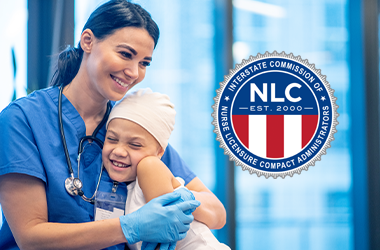Latest News
See All NewsCelebrate the Power of Nurses during National Nurses Week 2025
The Tri-Council for Nursing, an alliance of five national nursing organizations focused on nursing education, regulation and practice, salutes the nation’s 5.7 million licensed nurses during National Nurses Week, May 6-12.
Posted 05/01/2025
NCSBN Research Highlights Small Steps Toward Nursing Workforce Recovery; Burnout and Staffing Challenges Persist
The data reveal that more than 138,000 nurses left the workforce since 2022 and by 2029, almost 40% of nurses intend to leave the workforce, reinforcing concerns about ongoing labor shortages and systemic workforce challenges.
Posted 04/17/2025
Nurse Licensure Compact Commission Annual Report Now Available
The Nurse Licensure Compact Commission Annual Report for fiscal year 2024, the period from Oct. 1, 2023 to Sept. 30, 2024, is now available on NCSBN’s website.
Posted 03/11/2025
NCSBN is StateRAMP Authorized
NCSBN has achieved StateRAMP certification for its Nursys database, and ORBS and Passport products. NCSBN achieved StateRAMP authorization on Jan. 13, 2025, based on an independent assessment of cybersecurity and privacy standards.
Posted 02/27/2025




